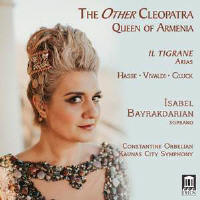Texte paru dans: / Appeared in:
Delos |
|
|
Outil de traduction ~ (Très approximatif) |
|
|
Reviewer: James
V. Maiello
From the title of the album,
The Other Cleopatra: Queen of Armenia, one might think that this project has
an ax to grind about the Cleopatra of the title playing second fiddle to a
more famous one. This is not the case. Rather, Isabel Bayrakdarian has
simply called attention to the character of Cleopatra of Pontus as she
appears in three operas about Armenian king Tigranes “the Great.” She
presents selections from Hasse, Vivaldi, and Gluck to show how this
Cleopatra was characterized musically in various ways. The project also
highlights the popularity of Tigranes as a subject for 18th-century opera.
The scope of Bayrakdarian’s program is logical and cohesive; this is a fine
example of the kind of “performance as research” that is taking place in
university music departments these days. By gathering these excerpts
together, she shows how the composers adjusted similar parts of the libretto
and treated them differently, though they all worked within a similar
musical idiom. First, Bayrakdarian is possessed of an exceptional instrument. Her voice is rich, but not too heavy, and she sings with enviable fluidity and depth. The passagework in arias like Hasse’s “Strappami pure il seno,” for example, is clean and articulated clearly. Vivaldi’s setting of the text is similarly challenging, technically, though he adopts a more sectional approach, contrasts that Bayrakdarian plays up to great effect. Indeed, she has a keen dramatic sense, which is on display throughout the program. Sighing motives are appropriately breathless and ritardandos into cadences are often on the theatrical side. Hasse’s setting of “Che gran pena” receives an elegant reading, graceful and refined, with Bayrakdarian’s luxuriant tone the star of the show. Throughout, her characterizations are intelligent and believable. Despite the varied tessituras and expressive devices employed by each composer, Bayrakdarian is consistent in playing Cleopatra with gravitas. This is not always the most convenient way to approach things like virtuosic passages, which might be easier to dash off coquettishly. Bayrakdarian has chosen a more convincing (and appropriate) approach to the queen, and she has the technique to do it effectively. Then there is the orchestra, which is something of a revelation. The string sound is glossy and lush, and they provide an understated, refined foundation for the soloist. Throughout, the phrasing is effortless, with Orbelian taking a discreet, tasteful approach. This is the first time I have heard the Kaunas Symphony Orchestra, but I’ll definitely be checking out more of their work. Perhaps
the most attractive quality of this disc is the sound itself. Bayrakdarian’s
voice has a sumptuousness that is well matched by the orchestra, and Delos
has recorded the music beautifully, though it is sometimes a little too cool
for my taste. The program presents a coherent theme from start to finish,
and it is satisfying, musically and intellectually. | |
|
|
|
|
Cliquez l'un ou l'autre
bouton pour découvrir bien d'autres critiques de CD |
|




